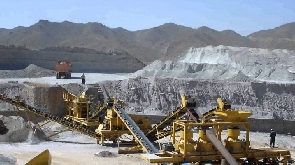The year 2023 is ending on a high note for the extractive sector. The sector, comprising mining and oil industries, exhibited resilience in the face of challenges.
The country’s return to the International Monetary Fund (IMF) merely a year ago, a strategic move shrouded in the government’s resolute commitment to fostering prosperity without external aid.
It is significant to underline that, throughout the passing year, the extractive sector not only weathered the storm but demonstrated a remarkable ability to thrive amidst challenges. The mining and oil industries, with their complex interplay of exploration, production, and global market dynamics, have emerged as pillars of economic vitality.
This review delves into key developments, achievements, and areas requiring attention, offering a nuanced perspective on domestic extractive sector over the past 12 months.Top of Form
Mining industry
There is no gainsaying that the country’s gold mining industry, a cornerstone of the extractive sector, maintained its position as one of the world’s leading gold producers.
The year saw increased production levels, driven by investments in modern technology and sustainable practices. According to Statista, the mining and quarrying sector contributed approximately GH₵5.8 billion, equivalent to roughly US$482.2 million, to the nation’s GDP, during the second quarter. This marked an increase compared to the previous quarter.
Gold production increased by 32 percent from 2.8 million ounces in 2021 to 3.7 million ounces in 2022, making the country Africa’s largest producer. The growth is attributed to increased output and expanded production at existing large-scale mines, with a 13 percent rise in large-scale sector production.
The Ghana Chamber of Mines (GCM) reported that its producing member companies contributed 3.0 million ounces, and the large-scale sector’s output rose by 12 percent year-on-year.
Although manganese and bauxite production declined, the the minerals and mining quarrying sector was the largest contributor to direct domestic taxes, totaling GH₵6.380 billion (18.6 percent of total direct domestic tax receipts).
Mineral export revenue surpassed proceeds from crude oil, cocoa exports, and inward remittances in 2022, consolidating the sector as the country’s largest source of forex.
In 2021, gold export receipts amounted to US$6.6 billion, revealing a decline from US$6.779 billion in 2020. This decrease was attributed to a contraction in gold production, particularly in the small-scale sub-sector. Overall mineral exports also decreased from US$6.998 billion in 2020 to US$5.241 billion in 2021, marking a 25 percent downturn.
The Minister of Lands and Natural Resources, Samuel Abu Jinapor, had earlier said gold exports in 2022 alone exceeded the total minerals export value for the previous year.
In the small-scale mining sector, there was a remarkable 550 percent increase in output, rising from 3,429.91kg in 2021 to 22,158.25kg in 2022. This surge is attributed to a reduction in withholding tax on unprocessed gold by small-scale miners, from 3 percent to 1.5 percent, introduced in 2015, according to government data.
Also, the GCM projected its members’ gold production to reach 3.2 million ounces by the end of 2023, with the country’s overall gold output projected between 3.3 and 3.5 million ounces.
But despite these positive strides, challenges persisted. Illegal mining operations across the country continued to pose environmental and social concerns, necessitating more comprehensive regulatory frameworks.
The government’s efforts to formalize ASM activities, while commendable, faced hurdles in implementation, underscoring the need for continued collaboration among stakeholders.
GCM also acknowledged that rising attacks on mining installations pose a threat to production, and emphasized the need for improved security to ensure sustainable development.
Also, concerns were raised about the potential adverse effects of the Growth and Sustainability Levy (GSL) on extractive sector companies.
Meanwhile, the country announced its readiness to welcome commercial exploration of green minerals, with the public proclamation of its maiden lithium lease agreement with Barrari DV Ghana Limited, a subsidiary of Australian-based Atlantic Lithium Company Limited.
Inaugural lithium lease
Situated at Ewoyaa (in the Mfantseman Municipality), inaugural lithium mine boasts a spodumene pegmatite resource of 35.3 million metric tons at 1.25 percent lithium oxide (Li₂O).
The agreement awards Barari DV the inaugural mining lease for lithium extraction at Ewoyaa. It covers a 15-year period and incorporates new and enhanced terms to ensure the country optimally benefits from this mineral.
This includes increased royalty rate, state and local participation, and value addition. The lease follows the completion of prospecting and feasibility studies by the company, as well as a series of negotiations between the state and Barari DV.
It covers an area of approximately 42.63 square kilometers. It grants the company exclusive rights to work and produce lithium and associated minerals in the area under the country’s mining laws.
However, since this announcement, various figures and entities, including think tanks and academia, have expressed concerns, with many suggesting the terms of the deal does not benefit the country.
Attempts to provide clarity have protracted the discussions, with many people now pushing for a paradigm shift in how the country negotiates its mining agreements.
Oil and gas sector
In the oil and gas sector, 2023 witnessed some major developments from the existing fields, while the global push to transition from fossil fuels gained traction, especially on the back of the Conference of Parties (COP) 28.
Challenges in revenue management and transparency persists. The need for more robust oversight mechanisms to ensure that oil revenues contribute effectively to national development remain a priority.
In the first three quarters of 2023, the oil and gas industry experienced a significant downturn. Crude oil production declined by 9.54 percent, totaling 35.42 million barrels compared to the same period in 2022. This drop is attributed to natural depletion in the TEN field and increased gas-to-oil ratio and water production in the Jubilee and Sankofa fields.
The Minister of Finance, Ken Ofori-Atta, presented these findings during the presentation of the 2024 Budget and Economic Policy. The Greater Jubilee field contributed 21.94 million barrels, the TEN field produced 5.02 million barrels, and the Sankofa-Gye Nyame field yielded 8.46 million barrels. However, this production level was 9.54 percent lower than the previous year.
Partners lifted 34.29 million barrels, with the Ghana National Petroleum Corporation (GNPC) lifting 6.65 million barrels on behalf of the state. Gas production reached 188,956 thousand standard cubic feet (Mscf), of which 77,876 Mscf was used for power generation and non-power purposes. Gas transportation figures were provided for the SGN, Greater Jubilee, and TEN fields.
The petroleum receipts for January to September 2023 registered a significant decline of 35.72 percent compared to the same period in 2022. Crude oil liftings alone amounted to US$509.68 million, and when factoring in other petroleum receipts, the total received into the Petroleum Holding Fund (PHF) was US$751.32 million. This marks a notable decrease from the US$1,168.99 million received during the same period in 2022.
Out of the total distributed amount of US$750.69 million, the National Oil Company (GNPC) received US$184.45 million. This allocation included an Equity Financing Cost of US$117.63 million and GNPC’s share of the net Carried and Participating Interest (CAPI), amounting to US$66.82 million.
The decline in petroleum receipts has raised concerns about the financial health of GNPC, potentially impacting ongoing projects and strategic initiatives in the oil and gas sector. This development has already garnered attention in financial markets, with investors closely monitoring the situation. Analysts attribute the decline to geopolitical factors, global oil prices, and production challenges.
Notable developments:
Regulatory and Governance Framework – In 2023, Ghana took significant steps towards enhancing the regulatory and governance framework of its extractive sector. The government continued to engage with industry stakeholders, civil society, and international partners to refine policies that promote responsible mining and sustainable resource management.
The Natural Resource Governance Institute (NRGI) played a crucial role in fostering transparency and accountability, providing a platform for the public to access information on revenue flows and industry practices.
Aker Energy’s Deepwater Tano/Cape Three Points Block:
Operator and Project: Aker Energy, the operator of Deepwater Tano/Cape Three Points block offshore.
Development Plan Submission: Aker Energy, representing its partners, presented the Plan of Development (PoD) to the Ministry of Energy in Accra.
Revised Timeline: Initially, Aker Energy promised the first oil by 2020 but has now revised the timeline to 2025.
Challenges and Delays: Aker Energy faced challenges, leading to repeated PoD submission delays since 2018, raising concerns about commitment.
PoD Significance: The PoD is a legal requirement outlining an integrated plan for optimal hydrocarbon reserve development, considering technical, economic, safety, and environmental aspects.
Pecan Field Development: The phased plan focuses on developing the Pecan field, the largest discovery in the contract area, located in ultra-deep waters. It involves a Floating Production Storage and Offloading (FPSO) vessel and a subsea production system (SPS).
Expectations: Aker Energy and partners anticipate significant proceeds for Ghana, aiming for sustainable and efficient development.
Tullow’s Jubilee South East (JSE) Project:
Crude Production Commencement: Tullow, in collaboration with joint partners, has initiated crude production offshore the JSE project, marking a significant milestone.
Production Boost: The first well’s operation is expected to increase the country’s crude oil output, providing a crucial boost after a downward trend since 2019.
Future Production Plans: Two additional wells and a water injector are set to come online this year, aiming to sustain gross Jubilee production of over 100,000 barrels of oil equivalent per day (BOPD).
Investment and Local Involvement: Tullow and partners invested $1 billion over three years, emphasizing the use of local suppliers and a majority of the local workforce, showcasing a commitment to developing local capacity.
Government Acknowledgment: The Minister of Energy commended Tullow and their partners for their work, highlighting the government’s commitment to leveraging resources for the people’s benefit.
Future Prospects: The joint-venture partners, including Kosmos Energy and Ghana National Petroleum Corporation, plan to identify high-grade future drilling locations to extend the plateau and realize the full potential of the Jubilee resource base.
Ceremony and Timeline: A ceremony to celebrate the first oil from the JSE project is scheduled for the third quarter of 2023.
Overall, these developments represent crucial steps toward revitalizing Ghana’s crude oil production, with both projects holding the potential for significant economic benefits and contributing to the country’s energy sector growth.
Conclusion:
Although this does not put in doubt the future of mining in the country, the lack of exploratory operations by any new mines, per the concerns of GCM, coupled with calls to reform mining regulations to give more advantage to the country among others, particularly heading into an election year, could impact the country’s hold as Africa’s leading producer of the commodity.
Ghana’s extractive sector in 2023 demonstrated resilience and adaptability amid global challenges. The strides made in sustainable practices, community engagement, and diversification efforts are commendable.
However, addressing persistent challenges such as illegal (informal) mining practices and ensuring transparent revenue management remains imperative.
As Ghana navigates the complexities of its extractive industries, the collaboration between government, industry, and civil society will be instrumental in securing a prosperous and sustainable future for the sector.
Business News of Thursday, 28 December 2023
Source: thebftonline.com













